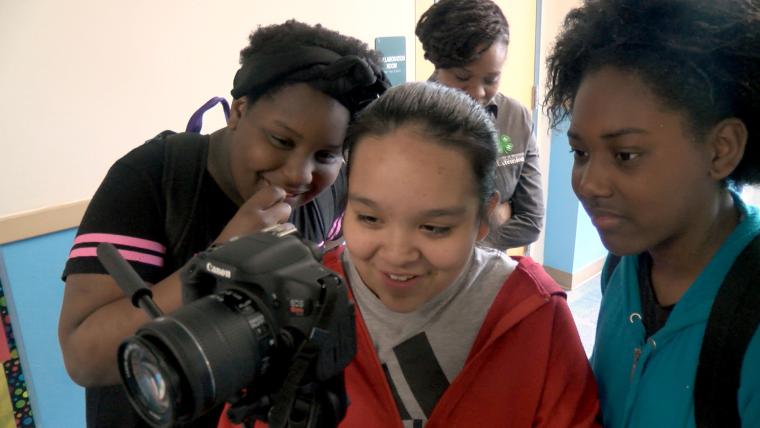KANSAS CITY, Mo. – “Quiet on the set! Camera ready?”
“Ready!”
The scene: A corridor at Johnson Elementary in Kansas City’s Hickman Mills school district. A girl stands in front of the camera holding a clapper board, a device familiar to anyone who’s watched movies about Hollywood.
“Scene one, take six,” she says.
“Action!” calls the director.
Three actors amble toward the camera. The characters talk about their weekend.
“Cut.”
The cast and crew of a short film called “The Glasses” are students enrolled in an after-school program run by the Local Investment Commission (LINC), a Kansas City, Mo., nonprofit. Since 2004, LINC has partnered with University of Missouri Extension’s 4-H Center for Youth Development to bring 4-H projects into the after-school program. Operating in 17 schools in three Jackson County school districts, the program serves about 2,300 students in kindergarten through eighth grade every school day.
The partnership allows LINC to make use of 4-H’s decades of research-based youth development expertise, notes Brent Schondelmeyer, LINC deputy director.
It also lets 4-H serve families with limited access to community-based 4-H clubs, says Beth Rasa Edwards, 4-H youth development specialist and supervisor of the program. “What University of Missouri Extension and 4-H bring into the after-school setting are a lot of the same things people see in a community-based 4-H program. You’re going to see project-based learning. You’re going to see experiential learning to gain a sense of mastery of different skills.”
The 4-H educators place a strong emphasis on career development and STEM (science, technology, engineering and math), she adds.
Project-based learning keeps kids engaged in ways that typical classroom-based education often doesn’t, says Christine Hines, 4-H educational program associate at Johnson Elementary and Dobbs Elementary. “The kids get more and more involved. You start to see the growth in their commitment they have to the project. They want to see it from the beginning to the end.”
That includes her filmmaking students in the hallway, who are patiently recording multiple takes, determined to get the scene right.
Edwards calls it “sneaky learning” and Schondelmeyer refers to it as “disguised learning”: learning that happens as a natural part of doing the project rather than as something needed to pass a test or complete an assignment.
And by working on projects, kids gain skills and knowledge beyond just the subject matter, Hines says. “During the school day, it’s writing and listening. With the hands-on approach, we’re helping to develop skills like collaboration, critical thinking, communication.”
In addition to filmmaking, projects include robotics, music recording, photography and graphic design. A gardening project incorporates plant science, while “cake chemistry” offers experiences students can apply in the kitchen and the laboratory.
“In every single one of our programs we talk about career development,” Edwards says. “We talk about what it takes to do something as a professional.”
That’s made a difference in how the students think about their futures, says Danisha Clarkson, a LINC employee who is site coordinator for the after-school program at Johnson Elementary. When asked what they want to be when they grow up, Clarkson says, kids typically reply with vocations like lawyer, athlete, singer or actress. The after-school program has made the students aware of more in-demand jobs such as architect, engineer or scientist.
“What this partnership does,” she says, “is allow these seeds of possibility to be planted in these children.”
Out in the hallway, the cast and crew of “The Glasses” are learning the value of persistence.
“Scene one, take seven.”
“Action!”
The program is funded by the Missouri Department of Elementary and Secondary Education through a grant from the U.S. Department of Education’s 21st Century Community Learning Centers program, which supports academic enrichment opportunities during non-school hours, particularly for children who attend high-poverty and low-performing schools.
